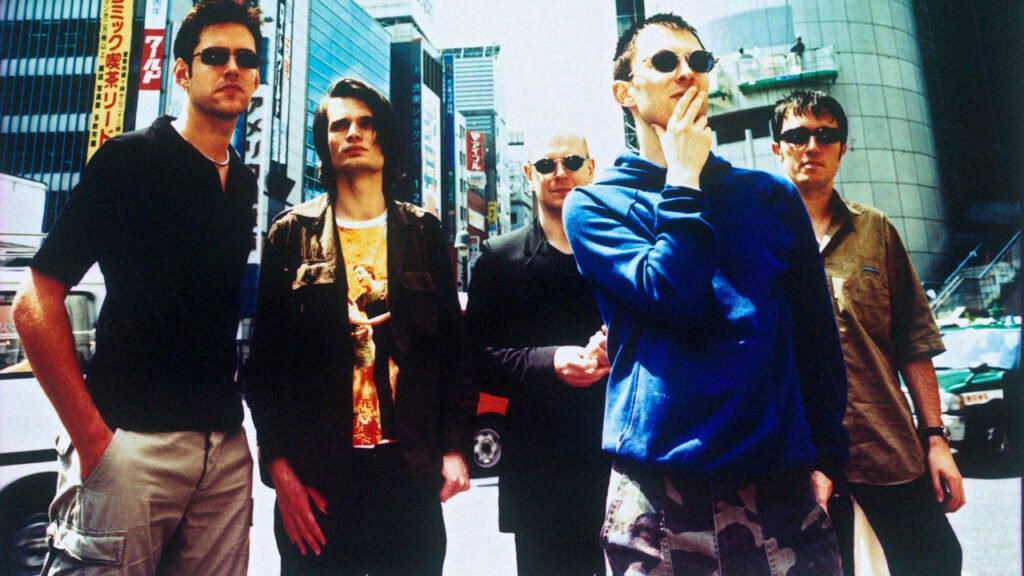Radiohead, the British alternative rock band formed in 1985, has consistently pushed the boundaries of music and lyrical content throughout their illustrious career. By the mid-90s, they had already achieved significant success with their first two albums, “Pablo Honey” and “The Bends.” However, it was their third studio album, “OK Computer,” released in 1997, that catapulted them into the realm of musical legends. This album, often hailed as a defining moment in the history of alternative rock, captured the zeitgeist of the late 20th century and resonated deeply with a generation grappling with rapid technological advancement and sociopolitical change.
“OK Computer” emerged at a pivotal moment when the world was on the cusp of a new millennium. The year 1997 was marked by a growing sense of unease about the future, driven by the digital revolution and the proliferation of global connectivity. The album’s release coincided with an era increasingly defined by technological dependency, corporate dominance, and a pervasive sense of alienation. In this context, “OK Computer” offered a profound commentary on the human condition, exploring themes of isolation, technological dystopia, and existential angst. Its innovative production and hauntingly beautiful compositions set it apart from the mainstream, making it a touchstone for both fans and critics alike.
The significance of “OK Computer” extends beyond its immediate critical acclaim and commercial success. It signaled a shift in the musical landscape, paving the way for future artists to explore more complex and unconventional sounds and themes. The album’s intricate layers of sound, combined with Thom Yorke’s evocative lyrics, created a rich tapestry that invited listeners to delve deeper into its meaning. Its impact was not just musical but cultural, influencing a wide array of genres and inspiring countless musicians.
Contextual Background

Historical and Cultural Context During the Album’s Release
In 1997, the world was experiencing a period of rapid change and uncertainty. The end of the Cold War had brought about a new global order, but it also left a void filled by economic globalization and the rise of neoliberalism. The cultural landscape was marked by a sense of both optimism and apprehension as societies grappled with the implications of an increasingly interconnected world. Pop culture was dominated by the explosion of the internet, which was beginning to reshape how people communicated, consumed media, and perceived reality.
The music scene in the late 90s was diverse and eclectic, with genres like grunge, Britpop, and electronic music vying for prominence. Bands such as Nirvana, Oasis, and The Prodigy had left their mark, and there was a growing appetite for innovative sounds that could capture the complex emotions of the era. Against this backdrop, Radiohead’s “OK Computer” emerged as a groundbreaking work that synthesized these influences while offering a stark critique of contemporary society.
Technological Advancements and Societal Concerns of the Late 90s
The late 90s were defined by significant technological advancements that fundamentally altered everyday life. The rise of personal computers, the advent of the internet, and the proliferation of mobile phones were revolutionizing communication and information exchange. These developments promised unprecedented convenience and connectivity, yet they also introduced new anxieties about privacy, identity, and the future of human interaction.
Societal concerns during this period included the increasing dominance of multinational corporations, the erosion of individual privacy, and the pervasive influence of media and advertising. There was a growing awareness of the environmental impacts of industrialization and consumerism, leading to a heightened sense of environmental responsibility and existential dread. The specter of a technologically driven dystopia loomed large in the collective consciousness, making the themes explored in “OK Computer” particularly resonant.
Radiohead’s Evolution Leading Up to “OK Computer”
Radiohead’s journey to “OK Computer” began with their debut album, “Pablo Honey” (1993), which introduced the world to their raw, alternative rock sound, epitomized by the breakout single “Creep.” However, it was their sophomore effort, “The Bends” (1995), that showcased their growth as musicians and songwriters. With more sophisticated arrangements and introspective lyrics, “The Bends” established Radiohead as a force to be reckoned with in the alternative rock scene.
As the band prepared to record “OK Computer,” they sought to transcend the conventional boundaries of rock music. Influenced by a wide range of artists, from Miles Davis to DJ Shadow, Radiohead began experimenting with unconventional song structures, ambient soundscapes, and electronic elements. The band isolated themselves in a remote mansion to foster creativity and avoid the pressures of the music industry, resulting in a more cohesive and innovative sound.
“OK Computer” was born out of this period of intense creativity and reflection. It was a bold departure from the guitar-driven anthems of “The Bends,” incorporating a broader palette of sounds and themes. The album’s lyrical content, penned primarily by Thom Yorke, reflected his growing disillusionment with modern society and his preoccupation with technology’s dehumanizing effects. The result was a seminal work that not only captured the spirit of its time but also anticipated many of the challenges and anxieties that would come to define the 21st century.
Themes of Isolation and Alienation

Analysis of Lyrics and Music that Reflect Isolation
“OK Computer” intricately weaves themes of isolation and alienation throughout its tracks, presenting a stark commentary on the disconnectedness pervasive in modern life. Radiohead’s evocative lyrics and innovative musical arrangements poignantly capture the sense of being adrift in an increasingly impersonal world.
The album’s exploration of isolation is underscored by Thom Yorke’s haunting vocal delivery and the band’s atmospheric soundscapes. The lyrics often depict characters who are detached from their surroundings and themselves, grappling with feelings of loneliness and existential despair. Musically, Radiohead employs a variety of techniques to evoke these emotions, from eerie electronic effects to minimalist guitar riffs, creating a sonic landscape that feels both expansive and claustrophobic.
Key Songs: “Subterranean Homesick Alien,” “Climbing Up the Walls”
“Subterranean Homesick Alien”
In “Subterranean Homesick Alien,” Yorke sings from the perspective of someone who feels profoundly out of place in their own world. The protagonist fantasizes about being abducted by aliens, hoping to find a sense of belonging among extraterrestrials rather than on Earth. The lyrics, “Up above, aliens hover / Making home movies for the folks back home,” convey a sense of yearning for escape from a reality that feels alienating and oppressive.
Musically, the song’s dreamy, reverb-laden guitars and ambient effects create an otherworldly atmosphere, reinforcing the theme of isolation. The track’s ethereal quality mirrors the protagonist’s desire to transcend their mundane existence and find solace in the unknown.
“Climbing Up the Walls”
“Climbing Up the Walls” delves into darker aspects of isolation, exploring themes of mental illness and inner turmoil. The song’s lyrics, “Either way you turn, I’ll be there / Open up your skull, I’ll be there,” suggest an inescapable sense of dread and paranoia, highlighting the internal struggle of feeling trapped within one’s mind.
The music amplifies this sense of claustrophobia, with dissonant strings, haunting whispers, and a relentless beat that builds to a chaotic crescendo. The disorienting soundscape mirrors the psychological distress described in the lyrics, creating a visceral experience of isolation and fear.
The Portrayal of Modern Life and Disconnectedness
Radiohead’s depiction of modern life on “OK Computer” is one of pervasive disconnectedness. The album paints a bleak picture of a society where technology and consumerism have eroded genuine human connections, leaving individuals feeling isolated despite being constantly surrounded by others.
Songs like “Fitter Happier” epitomize this critique, with its robotic narration listing the supposed improvements in a person’s life, only to reveal a profound emptiness beneath the surface. The mechanized voice and sterile, clinical delivery underscore the dehumanizing effects of modernity, where people are reduced to mere cogs in the machine.
The recurring imagery of alienation in “OK Computer” reflects a broader commentary on the human condition at the turn of the millennium. Radiohead captures the essence of a world where technological advancements, while promising greater connectivity, often result in increased isolation and a loss of authentic selfhood. The album’s exploration of these themes resonates deeply, offering a poignant critique of the disconnection that defines much of contemporary life.
Technology and Its Discontents

Examination of the Theme of Technology and Its Impact on Humanity
“OK Computer” is often lauded for its prescient examination of technology’s impact on humanity. Radiohead delves into the complexities of living in a world increasingly dominated by technological advancements, exploring how these developments shape, and often distort, human experiences and relationships. The album’s lyrics and soundscapes reflect a dystopian view of technology, suggesting that while it promises progress and efficiency, it also brings about profound discontents and dehumanization.
The album grapples with themes such as the erosion of individuality, the loss of genuine human connection, and the pervasive influence of corporate and technological control. These anxieties are conveyed through the band’s innovative use of electronic effects, dissonant arrangements, and Thom Yorke’s emotive vocals, which together create a sense of unease and alienation.
Key Songs: “Paranoid Android,” “Fitter Happier”
“Paranoid Android”
“Paranoid Android” stands out as one of the most iconic tracks on “OK Computer,” encapsulating the album’s themes of technological discontent. The song is a multi-part epic that shifts through various musical styles and moods, mirroring the fragmented and chaotic nature of modern life. The lyrics reflect a deep-seated anxiety about the dehumanizing effects of technology and corporate power.
Lines like “When I am king, you will be first against the wall / With your opinion which is of no consequence at all” express a bitter disdain for those who wield technological and corporate power without regard for individual humanity. The song’s haunting refrain, “The panic, the vomit / God loves his children,” juxtaposes human vulnerability with the cold indifference of technological progress.
Musically, “Paranoid Android” uses complex time signatures, abrupt shifts in tempo, and eerie electronic effects to create a sense of disorientation and instability. This reinforces the song’s themes, conveying a world where technology has run amok, leaving individuals struggling to find their place within it.
“Fitter Happier”
“Fitter Happier” is perhaps the most direct commentary on the dehumanizing effects of technology and societal expectations. The track features a monotone, computerized voice reciting a series of platitudes about self-improvement and conformity. The dispassionate delivery of phrases like “Fitter, happier, more productive / Comfortable, not drinking too much” underscores the soullessness of a life dictated by technological and corporate norms.
The song’s robotic narration and minimalist background music create a chilling atmosphere, suggesting a future where human beings are reduced to mere cogs in the machine, valued only for their productivity and adherence to societal standards. “Fitter Happier” serves as a stark warning about the dangers of allowing technology to dictate the terms of human existence, highlighting the loss of individuality and emotional depth that can result from such a society.
Dystopian Perspectives on Technological Advancements
Radiohead’s portrayal of technology on “OK Computer” is deeply dystopian, reflecting fears about the future of humanity in a world increasingly dominated by machines and corporate interests. The album suggests that technological advancements, while offering the promise of efficiency and convenience, often come at the cost of human values and connections.
Throughout “OK Computer,” there is a recurring theme of technology as an alienating force, one that distances individuals from each other and from their own humanity. This is evident in the mechanical, detached soundscapes of songs like “Fitter Happier” and the fragmented, chaotic structure of “Paranoid Android.” The album paints a picture of a society where technology has become an omnipresent, oppressive force, shaping lives in ways that diminish human agency and emotional richness.
Radiohead’s exploration of these themes resonates with contemporary audiences, as many of the issues they highlight—such as the loss of privacy, the rise of surveillance, and the dominance of corporate interests—have only become more pronounced in the years since the album’s release. “OK Computer” remains a powerful critique of a world where technological advancements often serve to alienate and control rather than liberate and connect.
Political and Social Commentary

Insights into the Political and Social Messages Within the Album
“OK Computer” is not only a masterpiece of musical innovation but also a profound statement on the political and social landscape of the late 20th century. Radiohead uses the album as a vehicle to critique the pervasive influence of consumerism, the insidious nature of political corruption, and the suffocating pressures of modern society. Through its lyrics and sonic textures, “OK Computer” articulates a deep sense of disillusionment with the status quo, urging listeners to question the forces shaping their lives.
The album’s political and social commentary is woven into its narrative, addressing the alienation and disenfranchisement felt by individuals in an increasingly corporatized and controlled world. Radiohead’s incisive lyrics and atmospheric soundscapes create a powerful critique of the systems that prioritize profit and power over human well-being and genuine connection.
Key Songs: “Electioneering,” “No Surprises”
“Electioneering”
“Electioneering” is one of the most overtly political tracks on “OK Computer,” taking aim at the manipulation and deceit inherent in political campaigns. The song’s driving rhythm and aggressive guitar riffs convey a sense of urgency and frustration, reflecting the band’s anger at the superficiality and corruption of political processes.
The lyrics, “I will stop, I will stop at nothing / Say the right things when electioneering,” expose the emptiness of political rhetoric and the lengths to which politicians will go to gain power. The repeated refrain, “When I go forwards, you go backwards / And somewhere we will meet,” underscores the cyclical and futile nature of political maneuvering, suggesting that true progress is often hindered by those in power.
“Electioneering” serves as a biting commentary on the ways in which politics is often reduced to a performance, with little regard for truth or the needs of the people. The song’s raw energy and pointed lyrics capture the disillusionment and cynicism that many feel towards the political establishment.
“No Surprises”
In contrast to the aggressive tone of “Electioneering,” “No Surprises” presents a more subdued, yet equally poignant, critique of modern life. The song’s gentle melody and soothing instrumentation belie its dark lyrical content, creating a haunting juxtaposition that amplifies its message.
“No Surprises” addresses the crushing weight of societal expectations and the numbing effects of a consumer-driven culture. The lyrics, “A handshake of carbon monoxide / With no alarms and no surprises,” depict a life of quiet desperation, where individuals are suffocated by conformity and the relentless pursuit of material comfort. The image of a “handshake of carbon monoxide” evokes a sense of fatal complacency, suggesting that the quest for a tranquil, untroubled life can ultimately lead to self-destruction.
The refrain, “No alarms and no surprises, please,” captures the yearning for simplicity and peace in a world that often feels overwhelming and oppressive. Yet, this desire for a predictable, unchanging existence is also shown to be a form of escape from the harsh realities of life, highlighting the tension between comfort and authenticity.
Critique of Consumerism, Political Corruption, and Societal Pressures
Throughout “OK Computer,” Radiohead offers a scathing critique of consumerism, political corruption, and societal pressures. The album portrays a world where individuals are increasingly commodified, and their value is measured by their ability to conform and consume. This critique is evident in the mechanical, dehumanizing tones of “Fitter Happier,” where the quest for self-improvement is reduced to a series of robotic tasks designed to enhance productivity rather than personal fulfillment.
Political corruption is another central theme, with “Electioneering” highlighting the superficiality and moral bankruptcy of political campaigns. The song’s aggressive energy and biting lyrics convey a sense of outrage at the manipulation and deceit that underpin the quest for power, urging listeners to see through the façade of political theater.
Societal pressures are depicted as a suffocating force that stifles individuality and genuine human connection. In “No Surprises,” Radiohead paints a bleak picture of a life lived in pursuit of material comfort and social approval, where the true cost is emotional and existential numbness. The song’s soothing melody contrasts with its dark message, underscoring the insidious nature of these pressures and the ways in which they can lull individuals into a false sense of security.
Existential Angst and Human Condition

Exploration of Existential Themes and Human Struggles
“OK Computer” delves deeply into existential themes, exploring the anxieties and struggles inherent in the human condition. The album captures the essence of existential angst, portraying characters who grapple with the search for meaning, the confrontation with mortality, and the inherent absurdity of life. Radiohead’s introspective lyrics and evocative music provide a poignant reflection on these universal human experiences, offering listeners a space to contemplate their own existence.
Throughout the album, Radiohead addresses feelings of despair, isolation, and the quest for purpose in a world that often seems indifferent to human suffering. The band’s use of haunting melodies, atmospheric soundscapes, and Thom Yorke’s emotive vocals creates a powerful sense of empathy and introspection, inviting listeners to engage with their own existential concerns.
Key Songs: “Lucky,” “Exit Music (For a Film)”
“Lucky”
“Lucky” stands as a beacon of hope amid the pervasive gloom of “OK Computer,” yet it still grapples with profound existential questions. The song tells the story of a man who survives a near-death experience, finding himself changed by the encounter. The lyrics, “Pull me out of the aircrash / Pull me out of the lake,” evoke a sense of desperation and relief, capturing the fragile line between life and death.
The chorus, “It’s gonna be a glorious day,” can be seen as both an affirmation of survival and a reflection on the fleeting nature of happiness and luck. The juxtaposition of hope and fragility in “Lucky” underscores the uncertainty of existence and the constant interplay between fortune and fate.
Musically, “Lucky” features soaring guitars and a lush, expansive arrangement that elevate the song’s emotional impact. The rich instrumental textures and Yorke’s impassioned vocals create a sense of transcendence, offering a moment of catharsis and reflection on the human condition.
“Exit Music (For a Film)”
“Exit Music (For a Film)” is a haunting meditation on mortality and the desire for escape. Originally written for the closing credits of Baz Luhrmann’s film “Romeo + Juliet,” the song captures the tragic intensity of the story while also addressing broader existential themes. The lyrics, “Wake from your sleep / The drying of your tears,” set the stage for a narrative of defiance and liberation, urging the listener to break free from oppressive circumstances.
As the song progresses, it takes on a darker tone, with lines like “We hope that you choke, that you choke” expressing a deep-seated anger and despair. The haunting melody and sparse instrumentation create an atmosphere of tension and vulnerability, reflecting the emotional turmoil of confronting one’s mortality.
“Exit Music (For a Film)” encapsulates the fear and inevitability of death, while also hinting at the possibility of transcendence through defiance and love. The song’s gradual build-up to a powerful climax mirrors the intensity of the human struggle for meaning and the ultimate acceptance of life’s impermanence.
The Search for Meaning and the Confrontation with Mortality
Radiohead’s exploration of existential angst on “OK Computer” is deeply intertwined with the search for meaning and the confrontation with mortality. The album’s characters often find themselves questioning the purpose of their existence and the value of their actions in a world that seems indifferent to their struggles. This existential questioning is a central theme that runs throughout the album, offering a profound reflection on the human experience.
In “Lucky,” the protagonist’s brush with death leads to a renewed appreciation for life, highlighting the paradoxical nature of existence, where moments of crisis can lead to profound insights and personal growth. The song’s hopeful tone suggests that, despite the inherent uncertainties of life, there is always the potential for redemption and transformation.
Conversely, “Exit Music (For a Film)” presents a more somber view of the human condition, emphasizing the inevitability of death and the futility of escape. The song’s portrayal of defiance in the face of mortality underscores the tension between the desire for control and the acceptance of life’s limitations.
Musical and Production Elements

Analysis of the Album’s Production Techniques and Musical Innovation
“OK Computer” is celebrated not only for its thematic depth but also for its groundbreaking production techniques and musical innovation. The album’s production, overseen by Nigel Godrich and the band itself, plays a crucial role in shaping its distinctive sound. Radiohead’s willingness to experiment with unconventional recording methods, diverse instrumentation, and complex arrangements resulted in a sonic landscape that was both cohesive and richly textured.
One of the most notable aspects of the album’s production is its use of space and atmosphere. Songs like “Airbag” and “Subterranean Homesick Alien” feature expansive soundscapes that evoke a sense of vastness and otherworldliness. This is achieved through the use of reverb, delay, and subtle electronic effects that create an immersive listening experience. Additionally, the album’s dynamic range, with its shifts from quiet, introspective moments to explosive crescendos, enhances the emotional impact of the music.
The band’s incorporation of diverse musical elements also contributes to the album’s innovative sound. From the lush string arrangements in “Exit Music (For a Film)” to the haunting mellotron in “Karma Police,” Radiohead seamlessly blends traditional rock instrumentation with orchestral and electronic textures. This fusion of styles adds depth and complexity to the album, making it a landmark in the evolution of alternative rock.
Contributions of Producers and the Band’s Experimentation with Sound
Nigel Godrich, who would become a long-term collaborator with Radiohead, played an instrumental role in the production of “OK Computer.” His meticulous attention to detail and innovative approach to recording helped the band realize their ambitious vision. Godrich’s use of unconventional recording spaces, such as the historic mansion St. Catherine’s Court, contributed to the album’s unique acoustic qualities. The natural reverb and ambient sounds captured in these settings added an organic layer to the music, enhancing its atmospheric depth.
Radiohead’s own experimentation with sound was equally vital to the album’s success. The band employed a wide array of techniques to push the boundaries of their music. For example, guitarist Jonny Greenwood’s use of the ondes Martenot, an early electronic instrument, added an eerie, ethereal quality to tracks like “Exit Music (For a Film)” and “The Tourist.” The band also experimented with tape loops, analog synthesizers, and digital effects, blending these elements to create a sound that was both futuristic and grounded in rock tradition.
The recording process for “OK Computer” was characterized by a spirit of exploration and innovation. The band often embraced accidents and imperfections, incorporating them into the final mixes. This approach is evident in the raw, unpolished feel of songs like “Climbing Up the Walls,” where distorted strings and dissonant tones convey a sense of psychological tension and unease.
How Musical Elements Enhance Thematic Expression
The musical elements of “OK Computer” are intricately tied to its thematic content, with production techniques and instrumentation serving to underscore the album’s exploration of alienation, technological discontent, and existential angst. The use of electronic sounds and effects, for example, mirrors the album’s dystopian view of technology’s impact on humanity. In “Fitter Happier,” the robotic, synthesized voice delivers a chilling critique of modern life’s dehumanizing routines, while the sterile, mechanical production enhances the sense of detachment and conformity.
In songs like “Paranoid Android,” the band’s dynamic use of shifts in tempo and mood reflects the chaotic and fragmented nature of contemporary existence. The track’s multiple sections, ranging from serene acoustic passages to frenzied, guitar-driven assaults, capture the instability and unpredictability of modern life. This structural complexity not only keeps the listener engaged but also reinforces the song’s themes of anxiety and disorientation.
The orchestral arrangements in tracks such as “Exit Music (For a Film)” and “No Surprises” add a layer of emotional depth that complements the lyrical content. The lush strings in “Exit Music (For a Film)” build to a dramatic crescendo, mirroring the song’s narrative of escape and defiance. Similarly, the gentle glockenspiel and soothing melody of “No Surprises” create a stark contrast with its dark lyrics, highlighting the tension between surface tranquility and underlying despair.
Closing Thoughts
“OK Computer” stands as a monumental work in Radiohead’s discography, and its exploration of key themes such as isolation, technological discontent, political corruption, societal pressures, and existential angst has left an indelible mark on both listeners and the broader music landscape. Each track on the album delves into the complexities of modern life, offering a profound critique of the forces that shape our existence. The album’s innovative production techniques and musical experimentation enhance these themes, creating a richly textured and immersive experience.
In the cultural and musical landscape, “OK Computer” occupies a unique and revered place. It is a testament to Radiohead’s visionary artistry and their ability to capture the zeitgeist of their time while addressing timeless themes. The album’s fusion of thought-provoking lyrics, innovative production, and emotional depth ensures its continued relevance and acclaim. As we reflect on “OK Computer,” we are reminded of the power of music to challenge, inspire, and connect us, even in the face of an ever-changing world.
